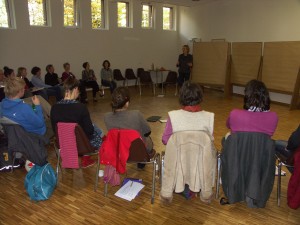
Contact
Prof. Dr. Kathrin Aghamiri
E-Mail: k.aghamiri (at) fh-muenster (dot) de
Prof. Dr. Benedikt Sturzenhecker
E-Mail: benedikt.sturzenhecker (at) uni-hamburg (dot) de
Participation in school settings
Democratic participation in schools and classrooms has become an increasingly discussed and tested topic in Germany over the past years. The reasons for this lie, amongst other things, in the current “classroom crisis” afflicting German schools, as educators and officials grapple with issues of how to keep students motivated and engaged in class, while at the same time avoid “poor” performance results (see PISA study). Schools in Germany are therefore gradually starting to shift towards a learner-oriented educational concept in the sense of a “house of learning”, an educational setting in which emphasis is placed not as much on the strict transfer of knowledge but rather competence acquisition and learning grounded in and gained through mutual policies and practices of students and educators within the school community.
Democratic competence by means of active acquisition gained through experience is precisely one of the competences that such schools undergoing structural and curricular transition are starting to embrace. Democratic participation in school settings has a dual aspect involving, on the one hand, its incorporation into the formal school curriculum and, on the other hand, its active acquisition as a form but also quality of life within the immediate school community. Participation is hereby learning objective and at the same time standard of quality with respect to the organization of school life.
Opening school to the outside world of its students as well as society at large also includes, as a third aspect, establishing a relationship between school and democratic society. Participation in school settings is not meant to be an isolated project, but rather a means of forging relations between school and the outside world of its students with its own respective democratic and political processes. Participation and democracy thereby constitute subject matter taught in class, a structural characteristic of school life, and an element of involvement in social democracy and politics.
However, putting these concepts into practice has proven difficult for schools: Given the structural imbalance of powers among those involved, the traditional emphasis on performance and acquisition of knowledge, the political neutrality in schools as well as the distance between school and the outside world of its students, participatory democratic practice in school settings can by no means be regarded as a matter of course. Despite a certain level of familiarity with democratic concepts as part of political education classes, for example, there is often a lack of pedagogical ideas and methods needed in order to construct classroom settings, but also life within the school community as a whole, conducive to participatory democratic practice. Studies show that genuine student participation is often all too easily watered down by circumventing their involvement in “truly important” decision-making processes.
Within the scope of major educational projects on democracy, such as the BLK (federal education commission) model project “Learning and Living Democracy”, German schools are increasingly challenged to develop concepts and settings for students to experience democracy. Child and youth welfare organizations can play an important role by supporting schools in such endeavors, as they can draw from their vast experience in democratic/participatory concepts within child daycare facilities as well as child and youth work. Working together to establish child and youth rights to participation as well as develop professional practice concepts is one of the most promising areas or topics of collaboration between school and youth welfare.
The Institute for Participation and Education can provide support in the following areas:
- Examination and expansion of the scope of child and youth participation practice within schools
- Development of appropriate professional practice concepts for individual schools
- Teacher/staff training in participatory practice
- Development of cooperation projects on democracy/participation between school and child and youth welfare
- Development of school projects on participation to assist children and young people in their growing involvement in decision-making processes at local community and government levels
